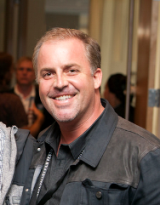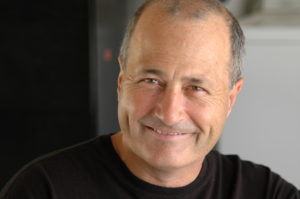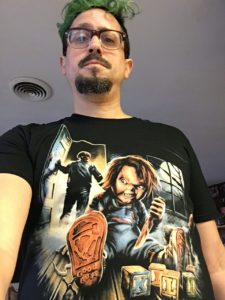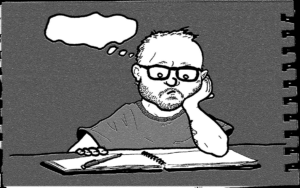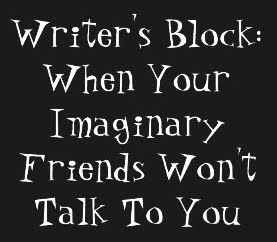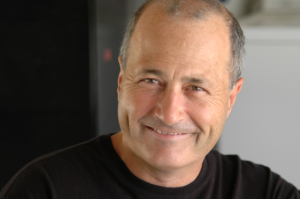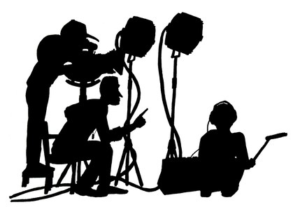If you’ve not seen it… Peelers is a fun filled horror film set in a strip club, more details here.
I was lucky enough to catch up with the writer recently and Lisa Devita was good enough to spend some time answering all my dumb questions and her answers are insightful, entertaining and often hilarious – thanks Lisa!
Q: Could you give me a little bit of background on how you got into screenwriting?
I was coming upon the last semester of my tenure at university… decision time… what do I want to do with my life once I must leave the sanctuary of school? I was at a loss as to what to do with a Bachelor of Arts degree with a major in English. My choices were to become a school teacher or get a job at a video store. I wasn’t very keen on either and then it hit me… all my life I’ve been a storyteller. I majored in English because I loved reading stories and I loved writing them. As a kid I’d spend hours in front of the mirror, not doing my hair and trying on makeup, but acting out plays, doing stand-up comedy and hosting variety shows. Just before I graduated I finally woke up and saw the answer that had been sitting right in front of me the whole time, I was just too wrapped up in university life to see it. But I wasn’t sure what type of writing I wanted to do so I enrolled in two courses that were quite different to see which one appealed: Copywriting and Screenwriting. The Copywriting class was interesting and fun but I didn’t like the whole consumerist angle to it and the storytelling aspect was kinda limited to an ADHD audience. The Screenwriting class however, grabbed me hook, line and sinker. I fell in love with every aspect… the character development, the dialogue, setting the scene, the hero’s journey, the plot twists, learning the lesson. All of it had me at “hello.” The next day, I applied to Vancouver Film School’s Writing for Film & Television program and have never looked back.
Q: Peelers is your first IMDB credit for Writing, but you have a number of credits in Editorial capacities – what did these entail?
I worked in Post Production mainly as a coordinator helping to streamline the editorial process. I loved it. Post Production is amazing to behold how it all comes together. I also worked in research and story development on a Factual TV series called “Vanity Insanity” that delved into the world of plastic surgery… very interesting and scary stuff. It was an amazing experience as I got to work in the area I’m most interested in (Story Development). I also worked in Clearances. Worst. Job. Ever. You’re basically asking permission to use someone’s likeness in a show, or a logo, or some footage, and nine times out of ten the answer is either “NO” or “what are you going to do for me?” Although the best answer I ever got (from an actor whose likeness we wanted to use) was a 2-page, single-spaced essay on how the work I was doing (in this case clearances on a documentary on vampires in film) was the work of the devil and if I only chose to follow Christ, that my life would be better for it. I still have the letter. It’s gold. Either way, I’m not one to ask for permission, it’s just not in my nature. So I quit very soon after.
Q: Was this experience useful to your screenwriting?
I would say this experience was far more useful in the world of office politics and learning how the whole process of TV making happens, and how building and nurturing relationships is essential. But the number one thing I learned that has been the most important lesson and carries me through my filmmaking career to this day, is that no matter what happens, if your lead actor drops out at the last minute, or your camera gear isn’t working on set, or the caterer doesn’t show up, that there is ALWAYS a way to get it (your shooting day) done. You just have to have hustle and creative chutzpah, but there is a way. It was the producer of the factual TV series we were working on who taught me that, Laura Watson. Sadly, she passed away a few years ago from breast cancer, but I’ve never forgotten that lesson (and watched her implement it on multiple occasions). In fact, we dedicated Peelers to her memory because there’s no way we could’ve made the film without remembering her lesson.
Q: Did you write anything else prior to Peelers, Shorts or Features?
Yes, I’ve written a couple of features and many, many shorts. I love shorts. I find them so easy to write. All you need is one great idea, or a great twist. I know they’re not the best way to try and make a living (unless you’re Pixar) but I still love writing them.
Q: And Peelers, was that spec or commission?
It was on commission. I’m supposed to get a dollar for the script (still haven’t seen it though). Such is the reality of indie filmmaking.
Q: How did you hook up with Seve (Peelers Director)?
Sevé’s sales agent on Skew (his first feature film) suggested he make another horror film because they’re easier to sell in the indie market. His only two requirements were that it have more blood and more nudity. And while I’m all for nudity (who isn’t?), Sevé didn’t want to make a film with gratuitous boob shots. So he thought: where can a film take place in which nudity is the norm? And the location for Peelers was born. At this time we were both working at one of the biggest production houses in Vancouver, BC within the post production department (he was a colorist and I was a post production coordinator). We had played baseball together a few times outside of work and therefore Sevé knew that I was working on my own screenplays, so he pitched me the idea of writing a horror script that takes place in a strip club. I used to live in Las Vegas so I had lots of source material and so I jumped at the chance to write the script. In fact, the story for Peelers was inspired by a crazy incident that happened to me while at a strip club in Las Vegas. But I’ll have to save that story for another time… Anyway, we both have the same sense of humor and we worked really well together so it turned out to be an amazing director-writer partnership where one person is a little nuts (the writer) and the other person reels it in and edits for structure and focus (the director).
Q: Did you have to change the script much to get the film made?
The basic concept for the story didn’t change but definitely a lot of the kills did. In my initial drafts I had some crazy kills that would’ve involved some pretty high tech special effects (or highly skilled visual effects) both of which we did not have access to and when Sevé read them in my script he kindly reminded me that we didn’t have a $25 million dollar budget, so it was back to the drawing board for many kill scenes. Basically, we discussed which kills we wanted to keep the most and spend our budget on. I was allowed to keep two or three, but the rest had to be “finessed” into indie budget standards in order for us to shoot.
Q: Peelers is proper old school exploitation, how much fun was it to write?
A ton of fun! As most of my friends and family can attest, I’m a teenage boy trapped in a woman’s body. I love crossing the line, pushing the envelope. I love potty humor and boobs. I have no filter and so this is how I approached the screenplay. Of course this is where Sevé makes for such a great creative partner – he encourages me to write sans filter on the first go-round, just get everything out there on paper, but then he sees the big picture (and the budget) so he’s a pro at knowing what to keep, what needs finessing and what needs to go. Sure I fight for my favorite stuff to stay in the picture; sometimes I win, sometimes I lose, but in the end, I trust Sevé and it’s always a learning process. The ending for example (I won’t give it away) Sevé and I debated a long time whether to keep it or not. We worried that people might think we went too far and end up hating the entire movie because of it. But in this overly politically-correct world, I’m always looking to offend, so we decided to keep it. And I’m glad we did because people go nuts for it. Audiences scream with devilish glee at it. And then turn around and say, “I can’t believe you went there.” And that’s my aim as a writer (well, one of my aims). I definitely was a champion for more humor in the script and Sevé wanted more of a serious tone, so those moments in the film that are cheesy and goofy and sick and twisted are my doing and the more pensive, somber moments have gone through the “Sevé edit.” In the end, I think we got the balance just right. We’ve had so many reviewers write that we got the mix of gore and humor bang on, which is so great to hear especially after months of back and forth deliberation wondering if we went too far down either end of the dark/dreary or ridiculous/cheesy spectrum.
Q: And you were also involved in the film’s production as a Producer, what exactly did this entail?
Producer = Do every role that you don’t have crew for (for indie filmmakers anyway). All you have to do is watch the credits roll at the end of Peelers and you’ll see mine and Sevé’s name on there at least 20 times (and of course there’s lots of stuff we didn’t bother taking credit for). And most of the roles I took on, I had zero experience in. But you learn pretty quickly, because if you don’t, there’s no movie. To this day (three years after production) I still have plantar fasciitis and achilles tendonitis from being on my feet all day, everyday during production. I refer to them as my battle scars. I worked extensively in acquiring sponsorship and music for the soundtrack, set design and construction, costumes, prop acquisition and rentals, location scouting, craft services and first aid to name a few. I was even a half naked body double. It was the hardest I’ve ever worked in my whole life. And I did it without pay. And I loved it. Sure there were tough times. But at the end of it all, it was truly amazing to take it all in and say, “Look at what we did!” Truly unbelievable.
Q: And how was the film funded, it wasn’t through poker winnings was it?
No poker winnings involved this time, haha, although it was seriously considered. And that’s no exaggeration… as indie filmmakers, you honestly consider EVERY possible way to raise funds for your film and since I’m pretty consistent at coming out ahead when I play, we toyed with the idea of me going to Vegas for a few months to “raise” money. Ultimately, we decided against it, as it was too time-consuming and not as cost effective as we imagined. We funded the film however, through all of our own money that we saved up from working our asses off at our paid jobs, lots and lots of favors, begging, loving parents, and Kickstarter. Although I wouldn’t do Kickstarter again. It’s much more bother than it’s worth.
Q: You’ve been on the road touring festivals with Seve/Peelers, fun or grind?
Although I’m definitely a “glass-is-half-full” kinda person, if I’m being totally honest, I’d have to say it was more grind than fun. Don’t get me wrong, some festivals are great. For example, A Night of Horror Festival in Australia was amazing, but that’s because it’s run by an amazing guy (who has become a good friend now). The Julienne Dubuque Fest is also incredible too. Also, run by an amazing woman. But most festivals are a total waste of time and money. It is truly the people running the show who make or break a festival and most are definitely broken. After our festival run I was totally burnt out and despondent from the overall experience. I will definitely be much more selective when choosing which festivals to attend in the future.
Q: And where are you with Peelers now, distribution all sorted and festivals finished?
Distribution is continually ongoing but so far we have distribution in Canada, USA and overseas. Festivals are done now, although we occasionally get asked to screen at various venues and conventions still. We even screened at a Drive-in in Shelbyville, Indiana this year! Very cool.
Q: And where can we see Peelers?
We are now all over the USA… RedBox, VOD, iTunes, Amazon.com, etc. Many foreign countries are picking us up and Canada is slowly coming along… I know that we are on VOD now. More to come…
Q: There are a ton of people out there who offer coverage services, notes, feedback and position themselves as gurus etc, what is your view on such services?
I’m sure those services are great if you can afford them, but I think the best script doctors are the ones who love stories, and yes, that’s probably most everyone, but that’s because I believe storytelling is an innate gift in all of us, some of us just practice it more often than others. My brother and sister for example are excellent script doctors. My sister is a book worm, and I give her my scripts to read all the time. I trust her because she knows instantly what works and what doesn’t, she has a great sense for pacing and flow in a story and yet she’s never been to film school or taken a course in screenwriting. My brother has seen every movie out there. He can tell you exactly what’s wrong with Star Wars Episode 3 before you even think about it. So I trust his input implicitly. You watch enough movies and read enough books, you know how a story is supposed to work, even if you’ve never written one yourself. Besides, the professional script doctors I’ve met are jaded, bitter and don’t have the time to watch movies or read books. I’d rather give my script to someone who wants to help me find the magic, not someone who wants to see me burn in hell, hahaha.
Q: What are your thoughts on the business side of screenwriting, getting your scripts ‘out there’ and networking to make connections?
I know networking is essential in order to make connections, in order to get your work out there, in order to get discovered, in order to make a living off of writing, and so on and so forth, but I just loathe it. I live inside my head, I don’t want to go out into the real world and make small talk. Besides, no one wants to talk to the writer (even though writers are the most interesting of the bunch!) But alas, if I want my work to be discovered, it is what I must do. And so, in between my writing and my drawing and my reading and my daydreaming, I plan on getting out there… I even got Larry King’s book on small talk entitled: “How to Talk to Anyone, Anytime, Anywhere.” It really is an amazing book, very helpful. I’ll be testing it out at an industry party soon. After a few drinks of course.
Q: If you’ve used services/sites like Inktip, SimplyScripts, The Blacklist, what’s your view on this type of model for screenwriters to get their scripts seen, and hopefully picked up?
I haven’t used these services yet but I’m definitely up for doing so one day when I become that proud parent who has a baby script I’d like to show off to others. I don’t know any screenwriters personally who’ve found success with any of these services, but I’ve read the loglines on The Blacklist website and some of them are great, so I’m sure, or at least I hope, these screenplays will get picked up.
Q: What are your thoughts on screenwriting competitions, entered any yourself, any success?
I think they’re all a scam. Just a way to make starving artists starve even more. I’d only enter a competition if the fee was waived. The fees are just way too high on the majority of competitions and only a very select few are worthy of your time. Similar to festivals.
Q: You worked for the World Series of Poker and I believe you play a bit too, what’s the highest level/buy in you’ve played at?
While I was working for the WSOP I was allowed to enter the Media-Celebrity event since I was part of the media. It takes place halfway through the World Series tournament and there are approximately 500 entrants. The buy-in is taken care of for you and your final table winnings (if you make it) are donated to the charity of your choice. It was an absolute blast. A few times I was down to my last chips, in serious danger of busting out, but I miraculously built up my stash each time. Celebs at my table at different points in time during the tournament included Jennifer Tilly (she’s very good, very aggressive player), Dick Van Patten and his son Vince Van Patten, Shannon Elizabeth and even the legendary Ron Jeremy (what an entourage he had… ) Amazingly, I actually made it to the final table and busted out in seventh place overall! Because of this, I’m listed on Card Player’s website (which in the poker world is a big honor, haha).
Q: How did you get into poker?
I was living in Las Vegas at the time and I’d always been intrigued by the game. I love games in general as I’m highly competitive. So one day, my boyfriend at the time taught me how to play. After a few home study sessions he surprised me on my birthday with a night out at a live poker table in a real casino. I started with 40 dollars at a 1-2 table. I was SO nervous. Each time the dealer called action on me I could barely hear him over the deafening thudding of my heartbeat. Whenever I placed a bet my hands shook uncontrollably, I could barely hold the chips without dropping them. I don’t know if anyone else noticed this but my boyfriend sure did, telling me it was so obvious. To this day my hands still shake whenever I have good cards, so friends and family always look for this (my poker “tell”) and avoid playing against me when they see it. I’m still working on learning to control it. Anyway, two hours later, I had made $200 so we decided to leave on a high, nothing too greedy since it was my first time. I was absolutely hooked on the game from that day forward. It was a great birthday.
Q: What projects are you working on now and when can next expect to see your name on the credits?
I’m all over the map at the moment. I’ve written a sci-fi novel (first draft) that is in desperate need of a re-write (but I’m excited to do so). I’ve also finished a family-comedy feature film script (quite the departure from a stripper horror). And I’m currently working on a dark comedy.
Q: You write fiction and factual too, how do you find it swapping between disciplines?
I find it much harder to write factual, and a bore, I can’t help but embellish. I’m not a fan of reality.
Q: What’s the best and worst screenwriting advice you’ve been given?
Best advice: “You can’t be afraid to look dumb, especially when writing comedy. You have to get through all the dumb stuff in order to get to the gold.”
Worst advice: “Write only what you know.”
Now for a few ‘getting to know Lisa’ questions
Q: What’s your favourite film? And favourite script, if they’re different.
Well, I have a Top Ten List of favorite films of course, but my top 3 are: The Natural, The Power of One and The Hangover. My favorite script however is Midnight Run by George Gallo. It is near perfect in every way. I never get sick of it.
Q: Favourite author and book?
A Princess of Mars by Edgar Rice Burroughs. It blew my mind. I didn’t want it to end.
Q: Beer or Wine (or something else)? And which variety?
A Moscow Mule.
Q: Favourite food?
Steak. And cheese. And ice cream. And burgers. Let’s just sum this up and say “COW” is my favorite food and everything that comes from cow. Butter too. Butter makes everything better.
Q: Fave type of poker? Favourite player?
7-card stud, hands-down. The “Old Gentlemen’s Game” as they call it. That’s the game I first learned to play at a casino. But with the rise in popularity of Texas Hold’em, it is near impossible to find a 7-card stud game anywhere these days. So I had to eventually learn Texas Hold’em. And while I do enjoy it, I much prefer 7-card stud. Texas Hold’em is mostly balls and luck. But 7-card stud is a thinking game of patience and strategy and timing. That’s probably why you’ll only see old men playing it. And me. Favorite poker player: Jesus aka Chris Ferguson. I love his calm, quiet demeanor. He was so cool and unassuming. And a brilliant player. No loud showboating like Phil Hellmuth or Mike “The Mouth” Matusow. For the record, neither of those guys shut up. Ever. I was there and witnessed this first-hand at the WSOP. Oh and also, Doyle “Dolly” Brunson is another favorite. He is a sweetheart. A true southern gentleman and so fun to watch play. It’s as if he can read minds.
Q: Any other interests and passions?
I’m an avid comic book collector/fan. And not just now because Marvel has usurped the world of film, but I’ve been a fan since I was a kid, back in the day when they made fun of you for reading comics. I’m also a HUGE baseball fan. Which is why Peelers has a prevalent baseball theme throughout. I loved interweaving the baseball element throughout the film. The same reason I love 7-card stud poker applies to why baseball is my favorite sport. It’s a thinking sport; replete with drama, poetry, tension, failure, joy, accomplishment, retribution. All the elements that make a great story. It is definitely the writer’s sport. As the saying goes: “Baseball is only boring to boring minds.” I totally agree.
Q: Any final thoughts for the screenwriters of SimplyScripts?
Write on. And never. Ever. Give. Up.
Thanks again Lisa.
Check out Peelers Official Website and IMDB
Stream it on Amazon Prime or iTunes or get the Blu-ray
About the reviewer: Anthony Cawood is an award winning screenwriter from the UK with 4 short films produced and another 10 or so scripts optioned and/or purchased. Links to his films and details of his scripts can be found at www.anthonycawood.co.uk.
![]()

 Most screenwriters quickly discover that writing isn’t the only challenge they face… they’re also expected to ‘get their scripts out there’ and connect with Producers looking for material.
Most screenwriters quickly discover that writing isn’t the only challenge they face… they’re also expected to ‘get their scripts out there’ and connect with Producers looking for material.